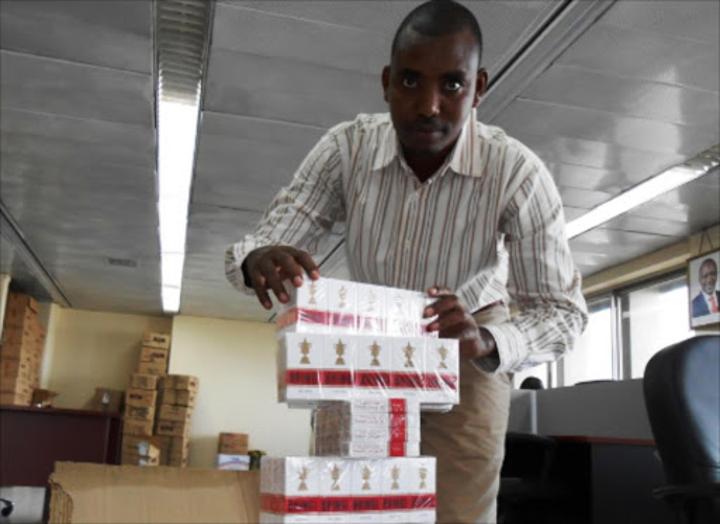Africa-Press – Kenya. From mobile phones, alcoholic drinks to cigarettes, Kenya has continued to witness rising cases of illicit trade, with goods mainly coming from China and neighbouring Uganda.
For instance, Uganda is a major source of illicit cigarettes , with 93 per cent of illicit cigarettes found in Kenya believed to originate from the country.
According to a survey by London based data analytics and brand consulting company–Kantar Group, almost one in four cigarettes smoked is illicit.
This, as BAT Uganda calls for enhanced action against illicit trade in Uganda, following a 2021 report, which indicates that the illicit trade incidence in cigarettes continues to rise significantly.
The research commissioned by BAT Uganda covered the second half of 2021.
It found out that 23.8 per cent of the cigarettes sold in Uganda appear to be illicit.
This represented an increase of 54.5% compared to September 2020 when the number stood at 15.4 per cent.
These illicit cigarettes are typically branded ‘Supermatch’, though the report makes no claim as to the actual manufacturer of each pack and bases its findings solely on the observable features of the packet.
BAT Uganda Chairman Elly Karuhanga said: “BAT Uganda is concerned that illicit trade in cigarettes is allowed to thrive in this country despite the various negative impacts, which include fueling organised crime.”
Downtown Nairobi is a busy area where fakes are moving fast.
On busy streets like Tom Mboya and Luthuli, you channces are in every five mobile phones being sold, three are fake, according to experts.
According to the Kenya Anti-Counterfeit Authority (ACA), 78 per cent of consumers in the country buy counterfeit goods because of the prices;
They are cheaper compared to original brands.
It is estimated that more than 70 per cent of Kenyans buy these products knowingly because the cannot afford originals.
With the high cost of living and raising prices of goods, mainly occasioned by the disruption in the global supply chain pegged on the Russia-Ukraine war, and the cost of doing business which has led to price hikes on both imports and locally manufacturers goods.
ACA has since warned of a rise in illicit trade with counterfeits leading.
Counterfeit refers to illicit trade that infringes Intellectual property rights such as trademarks, patents, designs and utility models.
From an inverted logo to interchanged words of leading brands, counterfeits are in almost all key sectors of fast moving consumer goods, ACA warns.
The most hit is however the electrical and electronics, mobile phone industry, food and beverages (mainly alcohol), cosmetics, clothing, leather and foot wear, with illicit trade in the country estimated at about Sh820 billion.
This is almost half the Sh1.76 trillion ordinary revenue target for KRA.
“We are concerned. People overlook quality and go for cheaper goods which majority are counterfeit. It is a case of consumer apathy,” ACA public relations officer Tom Muteti said during a telephone interview with the Star.
Stop Crime Kenya (StoCK) which has a secretariat at the Consumers Federation of Kenya (Cofek), warns that an increase in prices will push more Kenyans into buying counterfeits.
KENYA’S HIGH TAXES
Kenya’s formal economy is threatened by an increase in illicit trade and fake products, according to the Retail Trade Association of Kenya (Retrak).
This is mainly because of the high cost of doing business among them numerous taxes and an unpredictable business environment.
According to Retrak CEO Wambui Mbarire, the cost of doing business in Kenya has increased tenfold, mainly rising taxes.
“Repeated tax increases on alcohol, for example, have created a situation whereby nearly half, about 44 per cent of the alcohol consumed in Kenya is illicit,” Mbarire said.
This, she says, is costing taxpayers and the government an estimated Sh78 billion in lost revenue.
A further Sh4 billion in annual excise revenue is estimated to be lost through the illicit cigarette trade.
Border towns are notorious for trading in illicit and contrabands, where rogue players import cheaper goods from neighbouring countries through porous borders, evading taxes.
For instance, the cost of basic goods such as milk, flour, rice, and bread are on average between Sh20 and Sh50 cheaper in Uganda compared to Kenya.
Beer and cigarette prices are twice expensive in Kenya.
“This presents an obvious incentive for smugglers to exploit our porous borders and sell goods bought more cheaply in Uganda to customers in Kenya.
While the government has put in place measures to curb illicit trade and tax evasion, the impact on the ground is “very minimal”, Mbarire notes.
“Our lawmakers must be forced to acknowledge that their actions have had inadvertent consequences –fueling this criminality, through the current unpredictable fiscal policy that is driving increasing numbers of consumers to the shadow economy,” Mbarire said.
The association has since called on the government to create a conducive business environment to support the growth of genuine businesses while protecting them from rogue players.
According to Kenya’s Anti-Counterfeit Agency (ACA) illicit trade denies the taxman up to Sh153.1 billion annually.
The country is also losing between Sh85 billion and Sh100 billion annually to counterfeiting activities alone.
The Kenya Association of Manufacturers (KAM) has also noted a rise on illicit trade in excisable goods.
These include water, juices, cigarettes and alcoholic beverages, which are currently heavily taxed.
Most of the counterfeits are imported from Kenya’s key trading partners mainly China, India, Uganda, UAE, Turkey, Netherlands, France, Germany, the US, South Africa and the UK.
According to KAM , the deep penetration of mobile and internet access, and the ever-increasing use of social media platforms, has also seen a surge in the online purchase of products and services, some of which is counterfeit.
For More News And Analysis About Kenya Follow Africa-Press






